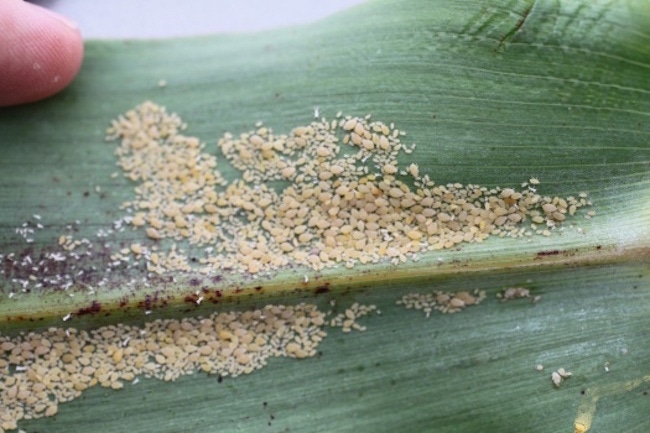May 4, 2015

Sugarcane aphids were spotted in South Carolina for the first time in October, and Clemson University entomologists are preparing for their return this growing season.
The hungry bugs typically eat sugarcane, but they’re now eating grain sorghum across the South as well, said Francis Reay-Jones, an entomologist at Clemson’s Pee Dee Research and Education Center in Florence. In addition to injuring or even killing sorghum plants, sugarcane aphids secrete a sticky substance that can clog and damage harvesting equipment, he said.
“Field trials in other states have shown yield losses of 20 to 50 percent, and in some rare cases, total crop loss,” Reay-Jones said.
Reay-Jones and Jeremy Greene, an entomologist at the Edisto Research and Education Center in Blackville, each will conduct field trials on sugarcane aphids this year. They’ll use the research to assess impact in South Carolina and develop an effective management plan for growers. Older pesticides have been only moderately effective on sugarcane aphids, Reay-Jones said.
South Carolina farmers harvested around 14,000 acres of grain sorghum valued at more than $5.3 million in 2012, according to the latest U.S. Department of Agriculture data. The grain is used for animal feed and has gained popularity because it is relatively drought resistant and has low input costs.
Sugarcane aphids were first identified in the U.S. in Florida in 1977. In 2013, the pest switched hosts and began feeding on grain sorghum. It spread rapidly from Texas to Southeastern states last year, including South Carolina, Reay-Jones said. The tiny tan-colored pests can colonize plants in the thousands, and they reproduce rapidly.
It’s unclear if sugarcane aphids can survive a South Carolina winter, but it is clear they cover ground quickly, Reay-Jones said.
“We think it needs a live host like Johnson grass. Typically those weeds are killed here over winter by the frost,” he said. “It might have to move again from the South into South Carolina, but it moved so quickly in the past couple years that we think it will be here.”
Growers, meanwhile, have a new pesticide to apply this year if they find sugarcane aphids in their fields. The U.S. Environmental Protection Agency approved in March the use of Dow AgroSciences’ Transform WG through Nov. 30. The Department of Pesticide Regulation, a regulatory agency based in Clemson University, applied for the EPA exemption to allow growers to use the pesticide this season.
“Transform WG is a much needed product and we are happy EPA supported our request. It should be a useful tool for South Carolina sorghum growers in their battle against sugarcane aphids,” said Steve Cole, director of regulatory services at Clemson.
You May Also Like




